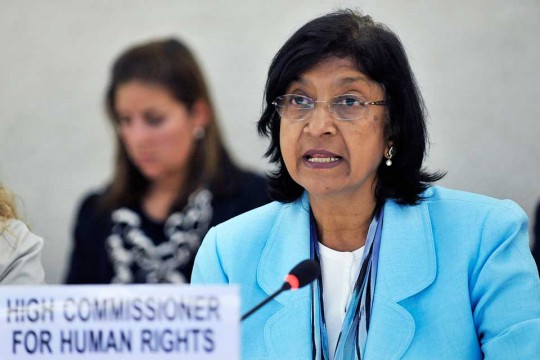UN rights chief welcomes new measure to stop violence against children
UN rights chief welcomes new measure to stop violence against children
 High Commissioner for Human Rights Navi Pillay
High Commissioner for Human Rights Navi Pillay
The United Nations rights chief today added her voice to the chorus of UN officials welcoming the decision by Member States to adopt a new protocol aimed at protecting children from abuse and violence.
The Optional Protocol to the Convention on the Rights of the Child, adopted yesterday by the General Assembly, will encourage State parties to develop national mechanisms enabling children whose rights have been violated to access a system through which their voices and complaints can be heard.
“We see every day examples of a wide range of human rights violations against children – from discrimination to child trafficking to all forms of physical or mental violence,” said UN High Commissioner for Human Rights Navi Pillay, who encouraged States to sign the Optional Protocol giving child victims of abuse direct access to an international human rights complaint apparatus.
“Children will now be able to join the ranks of other rights-holders who are empowered to bring their complaints about human rights violations before an international body,” Ms. Pillay added.
According to the new protocol, the Committee on the Rights of the Child will examine all complaints and determine whether the Convention on the Rights of the Child has been violated in each specific case.
The committee will then examine the complaint and may request that the State enforce interim measures preventing any further damage to the complainant.
Jean Zermatten, the Committee Chairperson, also celebrated the adoption of the protocol, noting that it took into consideration “the particular, special needs of children.”
Yesterday, Special Representative of the Secretary-General on Violence against Children Marta Santos Pais “wholeheartedly” welcomed the new measure, voicing the hope that it would help bring to an end “the invisibility and conspiracy of silence surrounding incidents of violence against children.”
The new protocol opens for signature in 2012 and will enter into force three months after it acquires ratifications or accessions from 10 countries.
###
About Office of the United Nations High Commissioner for Human Rights (OHCHR)
Who we are
The Office of the United Nations High Commissioner for Human Rights (OHCHR) represents the world’s commitment to universal ideals of human dignity. We have a unique mandate from the international community to promote and protect all human rights.
Leadership
The High Commissioner for Human Rights is the principal human rights official of the United Nations. The High Commissioner heads OHCHR and spearheads the United Nations’ human rights efforts. We offer leadership, work objectively, educate and take action to empower individuals and assist States in upholding human rights. We are a part of the United Nations Secretariat with our headquarters in Geneva.
The Office’s priorities are set out in two key strategic documents: the OHCHR Plan of Action and its Strategic Management Plan 2010-2011. These priorities include greater country engagement, working closely with our partners at the country and local levels, in order to ensure that international human rights standards are implemented on the ground; a stronger leadership role for the High Commissioner; and closer partnerships with civil society and United Nations agencies.
United Nations human rights system
We also support the work of the United Nations human rights mechanisms, such as the Human Rights Council and the core treaty bodies set up for monitoring State Parties’ compliance with international human rights treaties, promote the right to development, coordinate United Nations human rights education and public information activities, and strengthens human rights across the United Nations system. We work to ensure the enforcement of universally recognized human rights norms, including through promoting both the universal ratification and implementation of the major human rights treaties and respect for the rule of law.
Our structure
We have an office at United Nations headquarters in New York and offices in numerous countries and regions. In addition to the Executive Office of the High Commissioner and a number of units that report to the Deputy High Commissioner, OHCHR has two major divisions and four branches.
To implement our comprehensive mandate, we employ more than 850 staff (last update in April 2007), based in Geneva and New York and in 11 country offices and seven regional offices around the world, including a workforce of some 240 international human rights officers serving in UN peace missions. We are funded from the United Nations regular budget and from voluntary contributions from Member States, intergovernmental organizations, foundations and individuals.
###
> United Nations (UN).
 The United Nations was established on 24 October 1945 by 51 countries committed to preserving peace through international cooperation and collective security. Today, nearly every nation in the world belongs to the UN: membership totals 192 countries.
The United Nations was established on 24 October 1945 by 51 countries committed to preserving peace through international cooperation and collective security. Today, nearly every nation in the world belongs to the UN: membership totals 192 countries.
When States become Members of the United Nations, they agree to accept the obligations of the UN Charter, an international treaty that sets out basic principles of international relations. According to the Charter, the UN has four purposes:
- to maintain international peace and security;
- to develop friendly relations among nations;
- to cooperate in solving international problems and in promoting respect for human rights;
- and to be a centre for harmonizing the actions of nations.
###
* The above story is adapted from materials provided by United Nations (UN)
** More information at United Nations (UN)




















